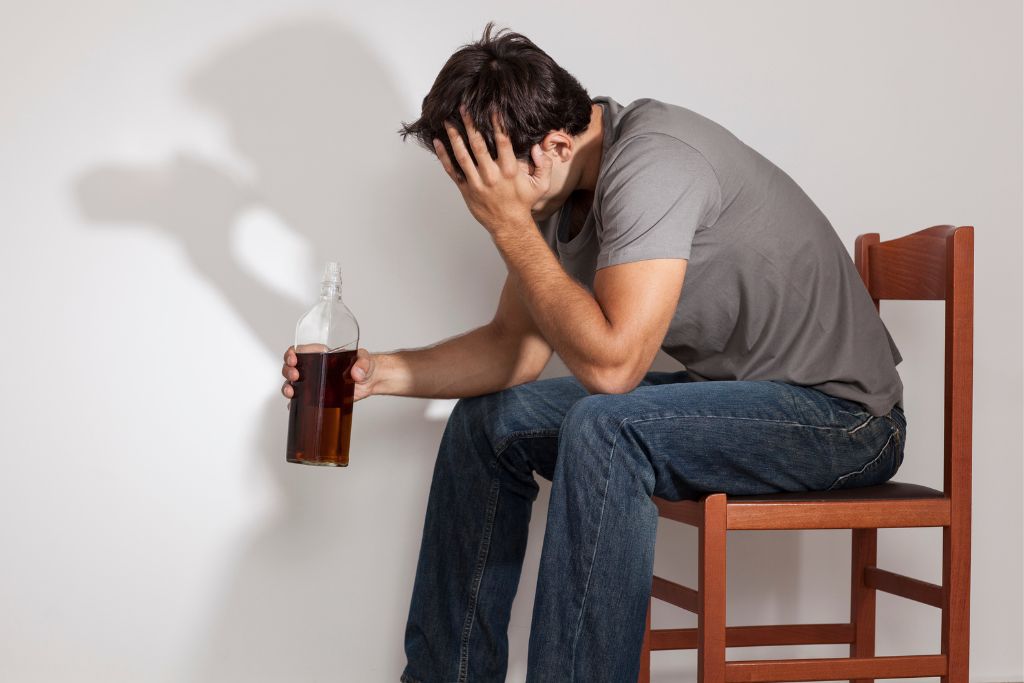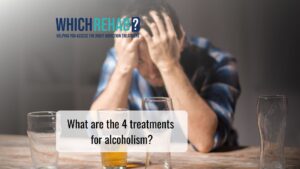Anyone with any experience of addiction will know it can manifest in a wide range of behavioural and physical symptoms. Understanding and recognising these symptoms of addiction is crucial for seeking appropriate help and support.
In this article, we will explore the symptoms and the various signs that can indicate the presence of a substance use disorder.
What we'll cover:
What is Addiction?

Addiction is a complex and chronic disease that affects millions of people worldwide. It’s not limited to a specific substance or behaviour but can encompass a wide range of addictions.
Some common types of addictions include substance addictions such as alcohol, drugs, and tobacco, as well as behavioural addictions like gambling, gaming, and even food.
There a various stages of addiction, but at its core, addiction is characterised by the brain’s reward and motivation functions being hijacked, leading to persistent and intense cravings for substances or behaviours. This compulsive need to engage in the addictive activity can often override rational thinking, causing individuals to prioritise their addiction over other aspects of their lives.
What are the Symptoms of Addiction?
The symptoms of addiction can be broadly categorised into three main areas: physical, behavioural, and mental.
Physical symptoms may include changes in appetite, sleep disturbances, and deteriorating physical health.
Behavioural symptoms can involve secrecy, dishonesty, and engaging in risky or illegal behaviour.
Mental symptoms may include mood swings, irritability, and feeling a loss of control over one’s thoughts and actions.
Let’s go into more detail on all of these to help you identify these symptoms for what they are, helping you to get the support you or your loved one needs.
DON'T STRUGGLE ALONE
Navigating the world of drug rehabs can be daunting. Let our team of rehab specialists guide you.
Physical Symptoms of Addiction
Addiction can take a toll on the body, leading to a range of physical symptoms.
Deterioration of physical health
Deterioration of physical health is a common symptom of addiction, and it is often one of the most dangerous symptoms. While this type of deterioration may not be immediately evident in the short-term, it becomes increasingly more noticeable with long-term use of a substance.
Common increased health risks include damage to the heart, liver, and kidneys as well as a weakened immune system. As an individual’s tolerance increases with continued use, the body is exposed to higher levels of toxic chemicals. This can lead to organ damage, such as scarring and inflammation in the heart or cirrhosis of the liver.
People exposing themselves to addictive substances for long periods of time are also at an increased risk for certain diseases such as cancer due to their altered immune systems and the increased number of toxins in their bodies.
Sleep Disturbances
People who suffer from addiction may experience difficulty sleeping, or they may sleep for extended periods of time. Other symptoms include insomnia, nightmares, and daytime fatigue.
Sleep disturbances can have a significant impact on an individual’s quality of life. It can lead to increased stress levels, irritability, and depression. It can also interfere with the ability to concentrate and focus, as well as the ability to carry out daily tasks.
Poor Personal Hygiene
Poor personal hygiene is one of the common symptoms associated with addiction. Individuals struggling with advanced addiction often neglect their personal grooming routines, leading to a messy appearance. They might have dishevelled hair, unclean clothing, and an overall unkempt appearance.
One noticeable sign of poor personal hygiene is the presence of unusual smells on the individual’s breath or clothes. Drug and alcohol use can cause individuals to have a distinct odour, such as a stale or sweet smell. This smell may be a result of substances metabolising in the body or the use of drugs that have strong scents.
Another indicator of poor personal hygiene in addiction is the presence of burns or soot on fingers or lips. These burns can occur from smoking drugs, such as crack cocaine or methamphetamine, which requires the use of a flame or hot pipe. The presence of burns or soot may suggest frequent drug use and an inability to maintain personal hygiene.
Track Marks
Track marks on arms or legs can also indicate if not addiction, drug use. Injection drug use, such as heroin or methamphetamine use, often leaves visible marks at injection sites. Individuals may attempt to hide these marks by wearing long sleeves, even in warm weather.
Unusual Eating Times or Patterns
Addiction can disrupt regular mealtimes and lead to irregular or unhealthy eating habits. Individuals struggling with addiction may prioritise substance use over eating, causing them to skip meals, binge eat and/or eat at unconventional times.
On top of this, individuals struggling with addiction may also isolate themselves during meal times. They may prefer to eat alone to conceal their addictive behaviours or to avoid judgment from others. This isolation can contribute to feelings of loneliness and further exacerbate their addiction-related challenges.
Weight Loss/Gain and Malnutrition
Intrinsically linked with disrupted eating habits, weight loss or weight gain and malnutrition are physical symptoms commonly observed in individuals struggling with addiction. As mentioned above, substance abuse can have a significant impact on appetite and nutritional intake, leading to these symptoms.
Significant changes in appetite, whether increased or decreased, can lead to dramatic increases or decreases in weight. The key thing to look out for is the change. While eating patterns and behaviours are not exclusive to addiction, significant weight changes are a good indicator of addiction. Addressing these issues and promoting healthy eating habits is crucial in supporting their overall physical health and recovery journey.

Dilated Pupils
Dilated pupils are a physical symptom commonly associated with addiction. When a person is under the influence of certain substances, their pupils can become abnormally large or dilated. This dilation is caused by the impact of these substances on the central nervous system.
Specific substances that are known to cause dilated pupils include stimulants such as cocaine, amphetamines, and MDMA. These drugs enhance the release of certain neurotransmitters in the brain, including dopamine and norepinephrine. This increased neurotransmitter activity triggers the muscles in the iris to relax, causing the pupils to expand.
Runny Nose
Though seemingly innocuous, a runny nose is a physical symptom that can often be associated with addiction and substance use. When individuals engage in substance abuse, particularly with drugs like opioids or cocaine, the body’s natural defence mechanisms can be affected. One of these effects is increased mucus production, which can lead to a runny nose.
It’s important to note that a runny nose alone does not necessarily indicate addiction or substance abuse. However, when combined with other signs and symptoms, such as intense cravings, poor performance, or legal issues, it may be a cause for concern.
Withdrawal Symptoms
The physical signs of withdrawal occur when an individual suffering from addiction suddenly stops using the substance to which they were addicted. Common withdrawal symptoms vary depending on the type of substance but often include nausea, headaches, shaking, insomnia, fatigue, depression, anxiety and irritability.
RELATED ARTICLE
What are the symptoms of Alcohol Withdrawal?
The symptoms off addiction are important to recognise. But equally important are the signs of withdrawal. Withdrawal without support can be life-threatening, so find out how to spot the signs today.
Behavioural Symptoms of Addiction
Behavioural signs can be one of the first indications that someone may be struggling with addiction. These signs can vary depending on the substance or behaviour being abused, but there are some common patterns to look out for.
Intense Cravings & Seeking Out the Substance/Behavior
Intense cravings are a common symptom experienced by individuals with addiction. These cravings are characterised by a powerful desire or urge to seek out the substance of abuse or engage in addictive behaviours. The intensity of these cravings can be overwhelming and can often feel like an uncontrollable force driving the individual to satisfy their addiction.
Cravings occur as a result of the brain’s reward centre being activated. When a person engages in substance use or addictive behaviours, the brain releases chemicals such as dopamine that create feelings of pleasure and reinforce the behaviour. Over time, the brain becomes conditioned to associate these substances or behaviours with pleasure, leading to the development of cravings.
Unfortunately, cravings can contribute to relapse. The intense desire to experience the pleasurable effects of the substance or behaviour can override a person’s ability to resist temptation and make rational decisions. This can result in a return to substance use or engaging in the addictive behaviour, perpetuating the cycle of addiction.
Triggers for cravings can vary from person to person but often include past memories associated with substance use, as well as current environmental cues such as being in places or situations where the person previously used the substance. These triggers can activate the brain’s reward centre, resulting in intense cravings and a heightened vulnerability to relapse.
Taking Risks to Obtain Substances
Addiction can lead individuals to take increasingly risky actions in order to obtain the substance of abuse. Over time, as addiction progresses, individuals may find themselves engaging in activities that they may have previously found unthinkable. These actions can range from stealing or fraud to selling drugs or even prostituting themselves.
These behaviours are driven by an overwhelming desire to satisfy their cravings and obtain the desired substance at all costs. It is important to note that these types of activities can often lead to serious legal charges and severe repercussions if they are not managed properly.
These risky behaviours can often lead to legal issues. Whether it’s for possession of illicit substances, or the actions they take to get them, individuals may face various consequences, including legal charges, probation, or court-ordered treatment.
Poor Performance at Home, Work, or School
Poor Performance is a significant consequence of addiction that can have detrimental effects on an individual’s life. Addiction disrupts various aspects of a person’s functioning, including their ability to fulfil daily responsibilities and tasks effectively.
At home, addiction can lead to a neglect of essential duties and responsibilities. Individuals may neglect household chores and maintenance. Their focus becomes consumed by obtaining and using substances, minimising their attention towards fulfilling their roles as partners, parents, or caregivers. Communication problems, financial strain, and strains in relationships can also arise due to the impact of addiction on family dynamics.
In the workplace, addiction can result in decreased productivity and poor performance. Absenteeism may become frequent, as individuals prioritise their addictive behaviours over their professional responsibilities. This can lead to missed deadlines, unfinished projects, and a decline in overall performance. Concentration and memory impairments, common symptoms of addiction, can further hinder one’s ability to effectively carry out tasks and meet expectations.
For students, addiction often leads to poor academic performance. Difficulty concentrating, lack of motivation, and decreased attention span can impede learning and studying efforts. Frequent absences, incomplete assignments, and poor grades can become the norm, hindering educational progress and potentially jeopardising future opportunities.
Avoiding Situations That Don't Involve Use
Individuals with addiction often exhibit avoidance behaviour, actively avoiding situations that do not involve substance use or their addictive behaviours. This avoidance behaviour stems from a strong desire to engage in addictive behaviour or use substances, leading to isolating oneself from friends, family, and other non-using individuals.
There are several common strategies that individuals with addiction employ to avoid situations and activities that do not involve their addictive behaviours. One such strategy is avoiding social events that do not involve substance use. They may skip gatherings or parties where they believe their substance of choice will not be readily available or where they fear they may be tempted to use.
Similarly, individuals with addiction may avoid hobbies or activities that do not involve their addictive behaviours. They may lose interest in activities they once enjoyed or withdraw from participating in them altogether. This withdrawal from previous interests can also contribute to a sense of isolation and disconnection from others.
BREAK FREE FROM ADDICTION
Book your free confidential consultation call now to discuss rehab options.
Mental Health and Emotional Symptoms of Addiction
Addiction not only affects physical health but also takes a toll on mental health and emotional well-being. Individuals struggling with addiction often experience a wide range of mental health and emotional symptoms.
Low Self-Esteem
Individuals with addiction often exhibit avoidance behaviour, actively avoiding situations that do not involve substance use or their addiction.
One of the most significant impacts of addiction on mental health is the negative effect it has on self-esteem and self-worth. As addiction progresses, individuals may feel a sense of guilt, shame, and worthlessness, leading to a decrease in self-esteem. This can perpetuate a cycle of self-destructive behaviours and further fuel the addiction.
Existing Conditions
Addiction can also exacerbate existing mental health conditions such as depression, anxiety, and stress. Substance abuse can intensify these symptoms, making it challenging for individuals to cope with their emotions. The cycle of addiction and mental health disorders often becomes intertwined, with addiction leading to worsening mental health symptoms and vice versa.
Mood Swings
Mood swings are a common symptom of addiction and can have a serious impact on an individual’s mental and emotional well-being. Mood swings can range from euphoria to extreme depression, irritability, or aggression. These mood swings can also affect relationships with family, friends, and co-workers, as well as interfere with job performance and academic success.
Poor Judgement
Poor judgement can signal a deeper issue. People who are suffering from addiction may have difficulty making sound decisions, leading to dangerous or destructive behaviour. It can cause them to make unsafe choices with drugs and alcohol, which can lead to long-term issues like chronic illness and even death. As mentioned earlier, poor judgement can also lead to other negative consequences such as financial problems, legal troubles, or relationship problems.
Memory problems
Individuals may have difficulty remembering things that happened in the past or retaining new information. They may also struggle to recall names, dates, or tasks. Memory problems can significantly affect everyday life and activities such as work, school, and relationships.
Feelings of Hopelessness
Hopelessness can come from feeling overwhelmed by problems related to addiction, such as financial, social, or legal issues. It can also stem from the guilt and shame associated with an active addiction.
When a person feels hopeless about their situation, it can cause them to give up on trying to get help. It’s important to remember that help is available and that recovery is possible.
Treatment for Addiction

The most effective treatment for addiction is a comprehensive approach that includes both psychotherapy and medical intervention. A combination of different approaches tailored to the individual’s needs is the best way to ensure a successful recovery.
Addiction rehab centres provide medical detox and therapies such as Cognitive Behavioural Therapy and Acceptance and Commitment Therapy to help people get on top of their addiction.
It’s a well-known fact that addiction is exceptionally hard to kick without professional help – check out our article on Rehab Success Rates for more on that – so finding a rehab solution that works for you is essential.
How to Get Help
Now that you understand the signs of addiction, the next step is to know where to turn if you recognise them in yourself or a loved one.
At Which Rehab, we understand that seeking help for your addiction can be difficult. Our team of dedicated and compassionate experts provide free, confidential advice to those who need it most. We offer a range of options to help individuals access the treatment they need.
Our team are available 24/7 to provide assistance and guidance in finding the right rehab centre for you. From detox clinics to residential rehabs, our specialist advisors will take the time to understand your needs and find the best solution for you.
With our support, you can start on the path towards recovery and reclaiming control of your life from addiction.
BREAK FREE FROM ADDICTION
Book your free confidential consultation call now to discuss rehab options.
FAQs
Spotting the signs of an addiction can be difficult since symptoms and behaviours vary from person to person. However, there are some common signs that can indicate a person may have an addiction.
People with an addiction may experience physical changes such as weight loss, poor hygiene, changes in sleep patterns, and red eyes due to lack of sleep or drug use. They may also have a lack of energy or an overall decline in physical health.
They may also exhibit behaviour changes such as difficulty concentrating, isolation from loved ones, and increased impulsivity. They may also become secretive or defensive when confronted about their behaviours.
If you or someone you know is exhibiting signs of addiction, it’s important to seek help as soon as possible. Addiction can have long-term physical and mental health consequences if not treated properly. Seeing a doctor is the first step in getting the help needed to treat addiction.
Addiction is a complex disorder that involves compulsive behaviours, which can have significant negative impacts on a person’s physical and mental health, relationships, and work. While some people may view addiction as a choice or moral failing, there is increasing evidence to suggest that addiction is actually a disease.
When it comes to the medical names given to addiction, there are several. These include Substance Use Disorder (SUD), Alcohol Use Disorder (AUD) and Process Addiction.
Substance Use Disorder (SUD) is a disorder in which an individual is unable to control their use of substances such as alcohol, drugs, and other addictive substances. Alcohol Use Disorder (AUD) is where an individual is unable to control their use of alcohol, and exhibits cravings, compulsive behaviour, and continued use despite negative consequences. Process Addiction relates to when an individual becomes addicted to activities such as gambling, shopping, sex, or the internet. Like substance abuse disorders, this type of addiction is characterised by cravings, compulsive behaviour, and continued use despite negative consequences.






